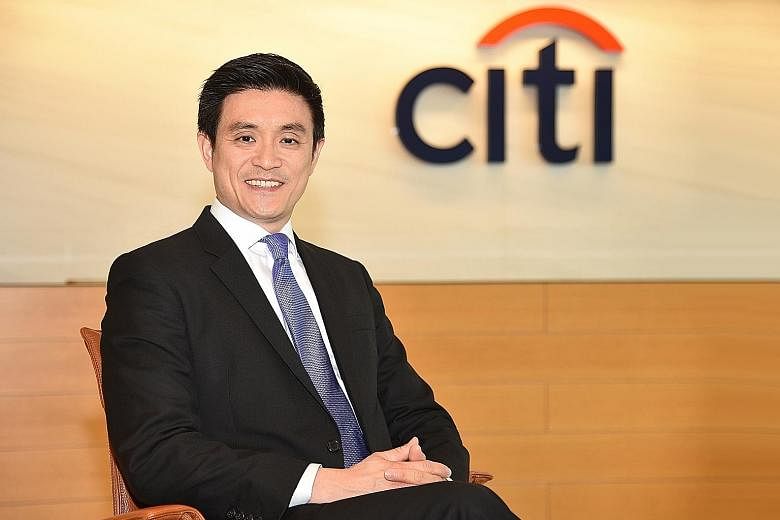A digital revolution has swept over the financial services industry and has paved the way for the rapid rise of financial technology, or fintech.
The banking experience today is no longer confined to a physical branch, an ATM or even a computer screen.
To meet the needs of digitally savvy consumers, financial institutions need to utilise new platforms to meet their customers wherever they work, live or play in the physical or digital worlds.
Our customers are digitally connected with us. More than 70 per cent of them in Singapore are transacting with us through the Internet.
The Mobile App lifestyle has enabled consumers to experience high-quality user experience (UX). This has raised the bar for the quality of customer experiences they have come to expect.
To service their customers more effectively, banks have to find ways to offer more automated yet relevant digitised services and tools that facilitate frictionless transactions, seamless service and higher value, wherever and whenever they want.

Digitisation of finance is creating a borderless infrastructure. Hence one of our core strategies is to be present in key digital ecosystems where our customers are active.
Citi's global presence allows us to draw deep insights across the different markets and geographies and come up with relevant solutions and applications that truly benefit customers and enhance their banking experience with us.
-
TERMS YOU SHOULD KNOW
For all that financial technology start-ups promise to disrupt traditional banking, they have one thing in common with the incumbents - a great deal of jargon. The Straits Times breaks down some commonly-used fintech terms.
APPLICATION PROGRAMMING INTERFACE (API)
This is a set of requirements that dictate how two pieces of software communicate. For instance, a bank's API is a set of code that would help to link a third-party application to that of the bank.
APIs allow for faster and more reliable software development. They are a major component of developing a more vibrant fintech sector.
BITCOIN
A form of digital currency, created and held electronically. Bitcoin, like any currency, can be used to buy things electronically. But its most important characteristic is that it is decentralised. No single institution controls the bitcoin network. It is an example of a growing category of money known as crypto-currency.
Bitcoin stores details of every single transaction that has ever happened in the network in a huge version of a general ledger, called the blockchain.
BLOCKCHAIN
A way to structure data, and the foundation of crypto-currencies like Bitcoin.
It is a decentralised digital ledger which records all digital transactions as a string of data. Every time a new batch of transactions is encrypted by the network, it is added to the string (or chain) as a "block". No single party has the power to tamper with the records.
CROWDFUNDING/PEER-TO-PEER LENDING
The practice of raising money through online platforms that match lenders directly with borrowers.
The peer-to-peer lending market aims to help smaller firms and individuals who might not otherwise be able to access bank financing.
CRYPTO-CURRENCY
A digital or virtual currency that uses cryptography for security. Crypto-currencies are backed by maths rather than the word of a government or financial institution. Bitcoin remains the most popular crypto-currency, but there are now thousands of others around.
New units of currency are generated by "mining" - which involves solving difficult maths problems and requires significant computing power. "Mining" is the process of verifying transactions and adding them to the public ledger or the blockchain, in the case of Bitcoin.
ROBO-ADVISER
An online wealth management service that provides automated, algorithm-based portfolio management advice. The services include automated portfolio planning, automatic asset allocation, online risk assessments, and account re-balancing.
This globality is what differentiates us from our competitors in the emerging fintech space.
From the United States to the Asia-Pacific, the fintech sector has exploded in recent years, with 4,000 to 5,000 start-ups in the space last year. Some US$20 billion (S$28.3 billion) in venture capital was also invested in these companies last year.
This rapid expansion requires traditional banks to take a step back and rethink their innovation strategies. The strengths of fintechs and banks are very complementary.
Fintechs lack the customer base, scale and sizeable infrastructure that incumbent banks possess, while traditional banks lag behind the fintech players in the creation of great UX for digital solutions.
Banks will need to become extraordinarily adept at integrating the best fintech innovations into their own operations. At Citi, we call this process of collaboration "fintegration".
Through some degree of controlled but open architecture, fintegration allows Citi to exploit our scale, brand and track record in providing secure and trustworthy services while leveraging the unique offering of fintech or other mobile solutions to offer and embed our services.
Consumers' frame of reference today is set by the brilliant ease of using their apps day in, day out - whether it is for social media, transportation or checking the weather.
That is where the real challenge lies now for traditional financial services providers. It is also precisely where fintech companies in general have been quick to bring similarly simple, streamlined and delightful experiences to their users.
Great interfaces, real-time data, intuitive processes and data visualisation are just some of the things consumers rightfully expect now, and that we are starting to provide.
EMBRACING THE PHENOMENON
For banks that wish to remain relevant to customers, they must embrace the fintech phenomenon wholeheartedly.
We believe a top goal for banks today is to become the best at fintegration. Whether it is mobile payment solutions or wealth management solutions, fintech players are unbundling pieces of the traditional banking model and using new technologies to enable significant speed and simplicity.
These innovative companies are able to help banks design simple, connected mobile solutions to serve consumers faster and better than anything available today.
One example of such a partnership is Citi Ventures, based in Silicon Valley. Through our Ventures team, Citi invests in start-ups, pilots new technologies and tests new solutions and business models through our Citi Innovation Labs and Citi businesses.
We also established a new Citi Fintech unit in October last year that leads the firm's dedicated efforts towards building the bank of tomorrow. With these efforts, our aim is to significantly increase the number of customers we are able to acquire, serve and process digitally.
Another key way that we are connecting with fintech innovators and start-ups is by opening up our APIs (application programming interfaces) for them to help build new experiences for our customers.
API shortens the time for banks to develop and bring new solutions to market, and allows them to be more agile in improving the customer experience.
Citi is the first global bank to launch a comprehensive range of APIs through the Citi API Developer portal.
Mobile application developers can have access to our APIs in a sandbox to use and build codes in multiple contemporary programming languages to provide banking services within their applications, leveraging on Citi's rich set of APIs.
This translates to new applications that can transform the customer experience across multiple geographies.
Through the global developer portal, Citi will grant developers access to APIs across various usage categories, including account management, peer-to-peer payments, money transfers to institutions, Citi rewards, investment purchases and account authorisation. Additional categories will be added over time.
Singapore is well placed to be a fintech hub for Asia and beyond. With strong support from the Government, start-ups here have been proactive in pursuing opportunities in this emerging sector.
Indeed, all but a dozen of the country's roughly 210 fintech firms have opened in the past two years.
This represents the fastest growth rate in Asia.
We believe that the overall banking industry should empower smarter financial decision-making through relevant and impactful data, connect customers to products and services that are exactly right for their needs, and deliver these through platforms favoured by them. This is made possible only by working with the partners beyond their usual reach, such as fintech innovators.
Ultimately, I believe the disruption of the financial services sector will lead to a vastly better future for consumers, as well as a vastly better future for our industry as we recraft strategy, processes and culture to fully realise the potential of new technology, whatever shape that may take.


